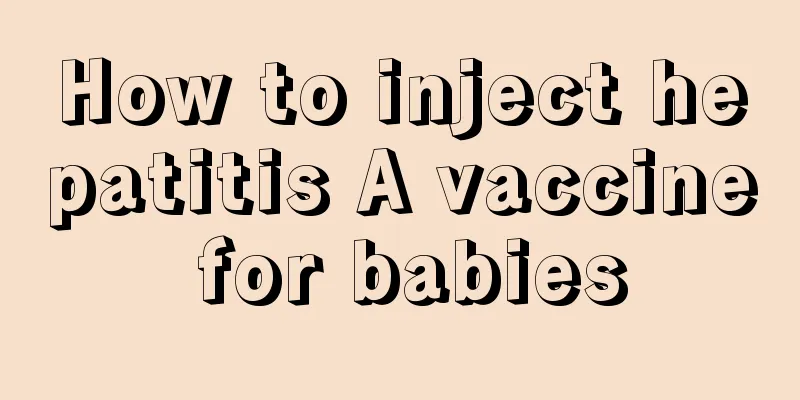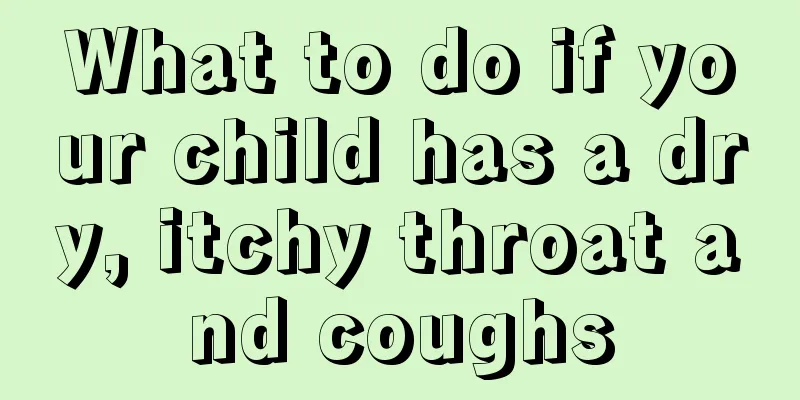How to inject hepatitis A vaccine for babies

|
Newborn babies are very weak and have no resistance. At this time, we need to artificially create some antibodies for the baby from the outside and inject them into the baby's body so that the baby has genes to resist many diseases from the beginning. There are many diseases in modern society. The main vaccines injected into babies are anti-infective vaccines. For example, how to inject the baby's hepatitis A vaccine? Let's take a look at the introduction below. There are two types of hepatitis A vaccines: inactivated vaccine and attenuated vaccine, and babies over one year old can be vaccinated. If it is an inactivated vaccine, the first dose is usually given at 12-23 months, and the second dose is given 6-18 months after the first dose; if it is a live attenuated vaccine, the first dose is usually given at 2 years old, and the second booster dose is given at 6 years old. The specific time for hepatitis A vaccination is: 1. Initial immunization time: for those who are susceptible to hepatitis A and are over one year old; 2. Boosting of immunity can be done six months after the initial immunization; 3. Those who have received live hepatitis A vaccine in the past can receive booster vaccination regardless of the length of the interval. Effective period: In recent years, observations on population vaccination have shown that if the hepatitis A live attenuated vaccine is used for immunization with the "two-injection method", with an interval of 1 month, 3 months, 6 months or 12 months, the anti-HAV positivity rate can reach 100%, and the anti-HAV titer can reach more than 1000 MIU/ml. It is recommended that the hepatitis A live attenuated vaccine be administered twice to provide lifelong immunity. Common side effects of hepatitis A vaccine include: mild pain at the injection site, local redness, swelling and lumps. Less than 5% of hepatitis A vaccine recipients experience systemic reactions, including headache (1 in 20 children), fever, nausea, loss of appetite (1 in 12 children), fatigue (1 in 14 children), etc. The incidence rate in children is slightly lower than that in adults. Most of these side effects of hepatitis A vaccine are common after the first injection of hepatitis A vaccine, and all of these side effects of hepatitis A vaccine will return to normal within 48 hours, so there is no need to worry too much about the side effects of hepatitis A vaccine. There are many diseases in modern times, which means we need to remain highly vigilant in society at all times. Especially for babies, it is very important to prevent some infectious diseases, and prevention should start from birth. The baby hepatitis A vaccine is a vaccine to prevent infectious liver disease, so it is necessary for babies to be injected. |
<<: What to do if your baby coughs and has a hoarse voice
>>: Why does my baby keep coughing after catching a cold?
Recommend
How many times a day does a baby with milk powder defecate
A baby is a new member of a family and a brand ne...
Is otitis media serious in children?
When the seasons change, it is very easy to catch...
What's going on with the small red pimples on the three-year-old baby's face?
Being a parent is a blessing. When you become a p...
What are the precautions for cutting children's hair
Although superstition is bad, all parents hope th...
What to do if a full-month-old baby gets angry
When your baby is one month old, you need to pay ...
Why is my 2-year-old baby's gums red and swollen?
Children are the treasures of the family, and all...
How to support newborns
The physical health of newborns is an issue that ...
Causes of dark circles under children's eyes
We know that the physical health of children is a...
At what age can babies eat crabs?
Whenever the Mid-Autumn Festival comes, there wil...
How much weight will you gain over the full moon?
For newborn babies, mothers must carefully observ...
What to do if your child falls and gets a bump on his forehead
When children are just learning to walk, they wil...
What to eat when baby sweats
I believe that many babies often encounter the si...
How to correct a baby's big right side face
Chinese people pay attention to symmetry, which i...
Why does a child have a nosebleed when he wakes up in the morning?
Children's physical fitness is not the same a...
What are the benefits of baby massage and touch exercises
As people's living standards continue to impr...









